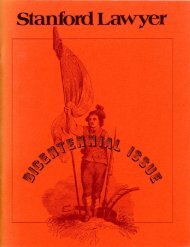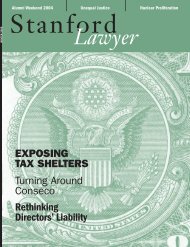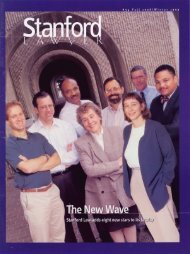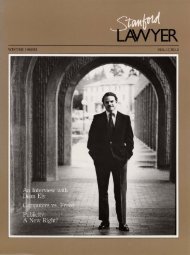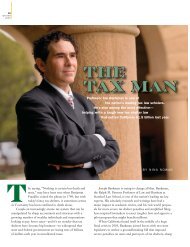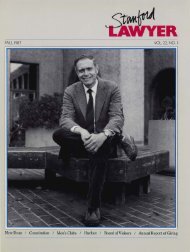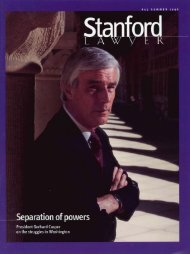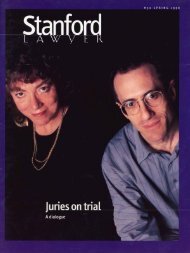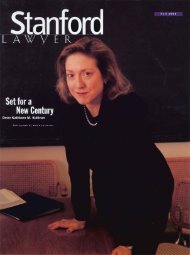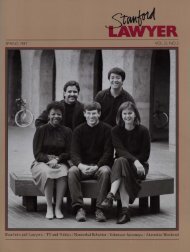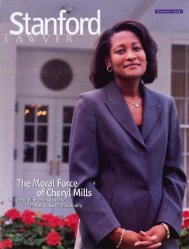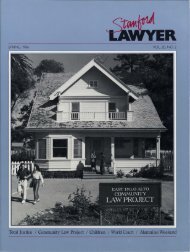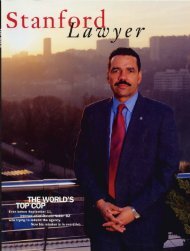Fall 1983 – Issue 30 - Stanford Lawyer - Stanford University
Fall 1983 – Issue 30 - Stanford Lawyer - Stanford University
Fall 1983 – Issue 30 - Stanford Lawyer - Stanford University
- No tags were found...
You also want an ePaper? Increase the reach of your titles
YUMPU automatically turns print PDFs into web optimized ePapers that Google loves.
@o~4t1J41~.LAW AND BUSINESS PROGRAMKenneth E. ScottRalph M Parsons ProfessorofLaw and BusinessRonald J. GilsonProfessor ofLawrofessor Gilson, after an introby Professor Scott (whoPductionspoke again later in the program),reported that the Business and LawProgram had progressed even morequickly than expected. "We'vereally accomplished an extraordinaryamount of the agenda thatI've described in past presentationsto the Board of Visitors," he said"not only quickly, but also well andbroadly."The plan has been, he explained,to establish a comprehensive sequencebeginning in the first yearand continuing with increasing sophisticationthrough the secondsemester of the third year. The advancedwork was conceived as takingtwo directions: (1) a heavy planningorientation, with applications toboth small and large business; and(2) a theoretical orientation, includingresearch, both for its ownsake and for its value in illuminatingthe planning effort.A substantial portion of thisagenda is now in place for thecoming (<strong>1983</strong>/84) school year-inaddition to which a new and relevantsubject area, which Professor Gilsonhad not previously described to theVisitors, has also been developed.This, he said, involves innovativecurriculum efforts by ProfessorRobert Mnookin in the estate andfamily planning area.Professor Gilson then describedeach development in more detail.A new first-year course, calledEconomics for <strong>Lawyer</strong>s / FinanceTheory, is designed to provide thekind of finance background uponwhich to build a business program.Law schools, he noted, have traditionallyregarded the first-yearcurriculum as sacrosanct, so theearly introduction of this newsubject matter-which relates tosome of the needs Charlie Mungermentioned earlier in the day-is ofinterest.Equally significant, Professor Gilsonnoted, is the fact that the coursewill be taught by Myron Scholes, oneof the nation's preeminent financialeconomists.The advanced work for third-yearstudents is also coming along,Professor Gilson continued. His owncourse on corporate acquisitions-which he views as simply a planningcourse for large corporations-isworking well. In fact, thematerials used for the course-linking the legal and financialeconomics aspects of corporateacquisitions - will be published byFoundation Press, and the course isalready being taught at two otherschools.The second element of the plan forthe advanced curriculum- theoreticalresearch- began in 1981/82when Professor Scholes, then avisiting professor at the BusinessSchool, joined with our ProfessorScott to teach a course in securitieslaw research. This course (to bedescribed in Professor Scott's presentation)is, Professor Gilson said,"a very exciting enterprise and wellworth your attention in comingyears."Professor Gilson then describedthe new area of individual and familyfinancial planning which developedrecently as a result of work byProfessor Mnookin.Professor Mnookin has put togethertwo courses. The first is abasic family and estate planningcourse, in which life-cycle planningis seen as an integrated processinvolving choices among a variety ofoptions only one of which is traditionaltestamentary disposition.Five problem sets are assignedduring the semester, and studentsdo two substantial planning memorandain lieu of a final examination.Next year, Gilson continued,Mnookin will be doing an advancedseminar on family financial planning,which will require students tobecome familiar with the use ofcomputers in modeling and analyzingplanning alternatives.Professor Gilson also called attentionto another interest of ProfessorMnookin's, which has broad applicationnot only to business law,but also to the general questions ofphilosophy and attitude raised in theearlier session on successful lawyering-namely alternative methodsof dispute settlement. "When wetalk about poor judgment," Gilsonobserved, "we often mean over-useof adversarial approaches." Negotiationand mediation are stressed in acourse for second- and third-yearstudents developed by ProfessorMnookin and Bea Moulton, a lecturerat the School.Gilson concluded with the observationthat there is probably no otherlaw school that has gotten as far as<strong>Stanford</strong> in curriculum developmentand innovation, of which the Businessand Law Program is an excellentexample.Professor Scott then described theproject-a research seminar basedon changes in securities prices-thathe and Professor Scholes introducedin the 1981/82 school year.The seminar, he says, involvesstudents in empirical research usingtheories concerning various factorsthat may affect the prices of individualstocks. The data understudy is of unusual quality, ProfessorScott noted, having been gatheredby Professor Scholes and his predecessorsat the Center for Research inSecurity Prices, at the <strong>University</strong> ofChicago. These data include day-to-42<strong>Stanford</strong> <strong>Lawyer</strong> <strong>Fall</strong><strong>1983</strong>




